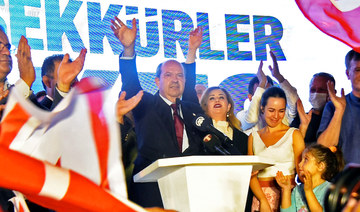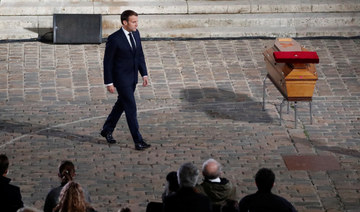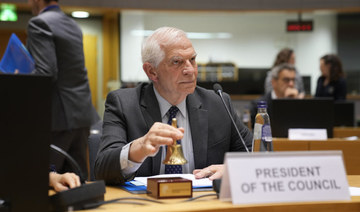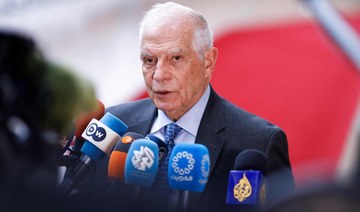ISTANBUL: France on Saturday said it was recalling its envoy to Turkey for consultations after comments by Turkish President Recep Tayyip Erdogan suggesting French counterpart Emmanuel Macron needed a mental health check-up that Paris condemned as unacceptable.
France and its NATO ally are at loggerheads over a range of issues including maritime rights in the eastern Mediterranean, Libya, Syria and the escalating conflict between Armenia and Azerbaijan over Nagorno-Karabakh.
But Ankara has now been particularly incensed by a campaign championed by Macron to protect France’s secular values against radical Islam, a debate given new impetus by the murder this month of a teacher who showed his class a cartoon of the prophet Mohammed.
“What can one say about a head of state who treats millions of members from different faith groups this way: first of all, have mental checks,” Erdogan said in a televised address in the central Anatolian city of Kayseri.
“What’s the problem of the individual called Macron with Islam and with the Muslims?” Erdogan asked.
“Macron needs mental treatment,” Erdogan added, while indicating he did not expect the French leader to win a new mandate in 2022 elections.
In a highly unusual move, a French presidential official said that the French ambassador to Turkey was being recalled from Ankara for consultations and would meet Macron to discuss the situation in the wake of Erdogan’s outburst.
“President Erdogan’s comments are unacceptable. Excess and rudeness are not a method. We demand that Erdogan change the course of his policy because it is dangerous in every respect,” the official told AFP.
The Elysee official, who asked not to be named, also said that France had noted “the absence of messages of condolence and support” from the Turkish president after the beheading of teacher Samuel Paty outside Paris.
The official also expressed concern over calls by Ankara for a boycott of French goods.
Macron this month described Islam as a religion “in crisis” worldwide and said the government would present a bill in December to strengthen a 1905 law that officially separated church and state in France.
He announced stricter oversight of schooling and better control over foreign funding of mosques.
But the debate over the role of Islam in France has hit a new intensity after the beheading of Paty, which prosecutors say was carried out by an 18-year-old Chechen who had contact with a jihadist in Syria.
Turkey is a majority Muslim but secular country which is a part of NATO but not the EU, where its membership bid has stalled for decades over a range of disputes.
“You are constantly picking on Erdogan. This will not earn you anything,” said the Turkish leader.
“There will be elections (in France) ... We will see your (Macron’s) fate. I don’t think he has a long way to go. Why? He has not achieved anything for France and he should do for himself.”
The other new rift between the two leaders is over Nagorno-Karabakh — a majority ethnic Armenian breakaway region inside Azerbaijan, which declared independence as the USSR fell, sparking a war in the early 1990s that claimed 30,000 lives.
Turkey is strongly backing Azerbaijan in the conflict but has denied allegations by Macron that Ankara has sent hundreds of Syrian militia fighters to help Azerbaijan.
Erdogan on Saturday accused France — which along with Russia and the United States co-chairs the Minsk Group tasked with resolving the conflict — of “being behind the disasters and the occupations in Azerbaijan.”
He also repeated previous claims that France, which has a strong Armenian community, is arming Yerevan. “You think you will restore peace with the arms you are sending to Armenians. You cannot because you are not honest.”
But the Elysee official said that Erdogan had two months to reply to the demands for a change in stance and that it ends its “dangerous adventures” in the eastern Mediterranean and “irresponsible conduct” over Karabakh.
“Measures need to be taken by the end of the year,” said the official.
France recalls Turkey envoy after Erdogan ‘mental health’ jibe at Macron
https://arab.news/76mcd
France recalls Turkey envoy after Erdogan ‘mental health’ jibe at Macron
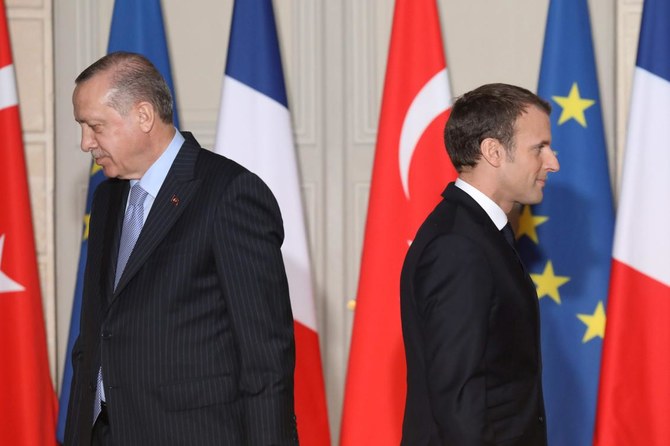
- France and its NATO ally are at loggerheads over a range of issues including maritime rights in the eastern Mediterranean
- Ankara has now been particularly incensed by a campaign championed by Macron to protect France’s secular values against radical Islam
Palestinians rally at historic villages in northern Israel

- The descendants of the 160,000 Palestinians who managed to remain in what became Israel presently number about 1.4 million, around 20 percent of Israel’s population
- Israel has killed more than 35,000 Palestinians in Gaza, mostly women and children, according to the health ministry in the Hamas-run territory
SHEFA-AMR: Thousands of people took part Tuesday in an annual march through the ruins of villages that Palestinians were expelled from during the 1948 war that led to Israel’s creation.
Wrapped in keffiyeh scarves and waving Palestinian flags, men and women rallied through the abandoned villages of Al-Kassayer and Al-Husha — many holding signs with the names of dozens of other demolished villages their families were displaced from.
“Your Independence Day is our catastrophe,” reads the rallying slogan for the protest that took place as Israelis celebrated the 76th anniversary of the proclamation of the State of Israel.
The protest this year was taking place against the backdrop of the ongoing war in Gaza, where fighting between Israel and Palestinian militant group Hamas has displaced the majority of the population, according to the United Nations.
Among those marching Tuesday was 88-year-old Abdul Rahman Al-Sabah.
He described how members of the Haganah, a Zionist paramilitary group, forced his family out of Al-Kassayer, near the northern city of Haifa, when he was a child.
They “blew up our village, Al-Kassayer, and the village of Al-Husha so that we would not return to them, and they planted mines,” he said, his eyes glistening with tears.
The family was displaced to the nearby town of Shefa-Amr.
“But we continued (going back), my mother and I, and groups from the village, because it was harvest season, and we wanted to live and eat,” he said.
“We had nothing, and whoever was caught by the Israelis was imprisoned.”
Palestinians remember this as the “Nakba,” or catastrophe, when around 760,000 Palestinians fled or were driven from their homes during the war that led to the creation of Israel.
The descendants of the 160,000 Palestinians who managed to remain in what became Israel presently number about 1.4 million, around 20 percent of Israel’s population.
Many of today’s Arab Israelis remain deeply connected to their historic land.
At Tuesday’s march, one man carried a small sign with “Lubya,” the name of what was once a Palestinian village near Tiberias.
Like many other Palestinian villages, Al-Husha and Al-Kassayer witnessed fierce battles in mid-April 1948, according to historians of the Haganah, among the Jewish armed groups that formed the core of what became the Israeli military.
Today, the kibbutz communities of Osha, Ramat Yohanan and Kfar Hamakabi can be found on parts of land that once housed the two villages.
“During the attack on our village Al-Husha, my father took my mother, and they rode a horse to the city of Shefa-Amr,” said Musa Al-Saghir, 75, whose village had been largely made up of people who immigrated from Algeria in the 1880s.
“When they returned to see the house, the Haganah forces had blown up the village and its houses,” said the activist from a group advocating for the right of return for displaced Arabs.
Naila Awad, 50, from the village of Reineh near Nazareth, explained that the activists were demanding both the return of displaced people to their demolished villages within Israel, as well as the return of the millions of Palestinian refugees living in the West Bank, Gaza and other countries.
“No matter how much you try to break us and arrest us, we will remain on our lands,” she insisted.
Egypt rejects Israel’s denial of role in Gaza aid crisis

- Sameh Shoukry: “Egypt affirms its categorical rejection of the policy of distorting the facts and disavowing responsibility followed by the Israeli side”
CAIRO: Egypt’s foreign minister on Tuesday accused Israel of denying responsibility for the humanitarian crisis in Gaza after his Israeli counterpart said Egypt was not allowing aid into the war-torn territory.
Israeli troops on May 7 said they took control of the Palestinian side of the Rafah crossing to Egypt as part of efforts to root out Hamas militants in the east of Rafah city.
The move defied international opposition and shut one of the main humanitarian entry points into famine-threatened Gaza. Since then, Egypt has refused to coordinate with Israel aid access through the Rafah crossing.
Sameh Shoukry, Egypt’s foreign minister, said in a statement that “Egypt affirms its categorical rejection of the policy of distorting the facts and disavowing responsibility followed by the Israeli side.”
In a tweet on social media platform X, Israeli Foreign Minister Israel Katz had said, “Yesterday, I spoke with UK Foreign Secretary David Cameron and German Foreign Minister Annalena Baerbock about the need to persuade Egypt to reopen the Rafah crossing to allow the continued delivery of international humanitarian aid to Gaza.”
Katz added that “the key to preventing a humanitarian crisis in Gaza is now in the hands of our Egyptian friends.”
Shoukry, whose country has tried to mediate a truce in the Israel-Hamas war, responded that “Israel is solely responsible for the humanitarian catastrophe that the Palestinians are currently facing in the Gaza Strip.”
He added that Israeli control of the Palestinian side of the Rafah border crossing and its military operations exposes “aid workers and truck drivers to imminent dangers,” referencing trucks awaiting entry to Gaza.
This, he said, “is the main reason for the inability to bring aid through the crossing.”
UN chief Antonio Guterres said he is “appalled” by Israel’s military escalation in Rafah, a spokesman said.
Guterres’ spokesman Farhan Haq said “these developments are further impeding humanitarian access and worsening an already dire situation,” while also criticizing Hamas for “firing rockets indiscriminately.”
Since Israeli troops moved into eastern Rafah, the aid crossing point from Egypt remains closed and nearby Kerem Shalom crossing lacks “safe and logistically viable access,” a UN report said late on Monday.
Daesh claims attack on army post in northern Iraq

- Daesh said in a statement on Telegram it had targeted the barracks with machine guns and grenades
BAGHDAD: Daesh claimed responsibility on Tuesday for an attack on Monday targeting an army post in northern Iraq which security sources said had killed a commanding officer and four soldiers.
The attack took place between Diyala and Salahuddin provinces, a rural area that remains a hotbed of activity for militant cells years after Iraq declared final victory over the extremist group in 2017.
Security forces repelled the attack, the defense ministry said on Monday in a statement mourning the loss of a colonel and a number of others from the regiment. The security sources said five others had also been wounded.
Daesh said in a statement on Telegram it had targeted the barracks with machine guns and grenades.
Iraq has seen relative security stability in recent years after the chaos of the 2003-US-led invasion and years of bloody sectarian conflict that followed.
Israeli forces repeatedly target Gaza aid workers, says Human Rights Watch

- They are among more than 250 aid workers who have been killed in Gaza since the war erupted more than seven months ago, according to UN figures
- Israel has killed more than 35,000 Palestinians in Gaza, mostly women and children, according to the health ministry in the Hamas-run territory
JERUSALEM: Human Rights Watch said on Tuesday that Israel had repeatedly targeted known aid worker locations in Gaza, even after their coordinates were provided to Israeli authorities to ensure their protection.
The rights watchdog said that it had identified eight cases where aid convoys and premises were targeted, killing at least 15 people, including two children.
They are among more than 250 aid workers who have been killed in Gaza since the war erupted more than seven months ago, according to UN figures.
In all eight cases, the organizations had provided the coordinates to Israeli authorities, HRW said.
This reveals “fundamental flaws with the so-called deconfliction system, meant to protect aid workers and allow them to safely deliver life-saving humanitarian assistance in Gaza,” it said.
“On one hand, Israel is blocking access to critical lifesaving humanitarian provisions and on the other, attacking convoys that are delivering some of the small amount that they are allowing in,” Belkis Wille, HRW’s associate crisis, conflict and arms director, said in Tuesday’s statement.
HRW highlighted the case of the World Central Kitchen, a US-based charity who saw seven of its aid workers killed by an Israeli strike on their convoy on April 1.
This was not an isolated “mistake,” HRW said, pointing to the other seven cases it had identified where GPS coordinates of aid convoys and premises had been sent to Israeli authorities, only to see them attacked by Israeli forces “without any warning.”
EU top diplomat sees US ‘fatigue’ in Mideast

- Josep Borrell strongly criticized Israel’s war campaign, saying Gazans were ‘dying and starving and suffering in unimaginable proportions’ and that it was a ‘man-made disaster’
- Josep Borrell: ‘I see a certain fatigue from the US side to continue engaging in looking for a solution’
SAN FRANCISCO: The European Union’s top diplomat has said that the United States is showing “fatigue” in its Middle East diplomacy and called for greater EU efforts toward a Palestinian state.
On a visit to California, the bloc’s foreign policy chief Josep Borrell again strongly criticized Israel’s war campaign, saying Gazans were “dying and starving and suffering in unimaginable proportions” and that it was a “man-made disaster.”
“I see a certain fatigue from the US side to continue engaging in looking for a solution,” Borrell said in a speech Monday at Stanford University that was publicly released on Tuesday.
“We are trying to push with the Arab people in order to build together, the Arabs and Europeans, to make this two-state solution a reality,” he said in English.
US Secretary of State Antony Blinken has made seven trips to the Middle East since the unprecedented October 7 attack on Israel by Hamas which prompted a relentless Israeli military campaign in Hamas-ruled Gaza.
He has nudged Israel to allow in more aid, pushed against a regional escalation and pleaded for Israel to accept a two-state solution as part of a broader eventual deal that includes normalization with Saudi Arabia.
But the United States vetoed a Security Council bid to give Palestine full UN membership, arguing that statehood can only come though negotiations that address Israel’s security concerns.
The General Assembly last week passed a symbolic vote for Palestinian membership with the United States one of only nine countries to vote against.
The others opposed included two European Union members — the Czech Republic and Hungary. Among EU heavyweights, France voted in favor and Germany abstained.
Borrell acknowledged that the vote showed the European Union was “very much divided” over Gaza, unlike on the Ukraine war, and cited “historical reasons.”
“But it doesn’t mean that we don’t have to take a stronger part of responsibility because we have delegated (to) the US looking for a solution,” he said.
Borrell, a former Spanish foreign minister, in February sharply criticized the US arms flow for Israel, pointing to President Joe Biden’s own words that too many people were dying in Gaza.
Biden last week for the first time threatened to cut military aid to Israel, with one shipment of bombs already halted, if Israel defies US warnings and assaults the packed city of Rafah.



